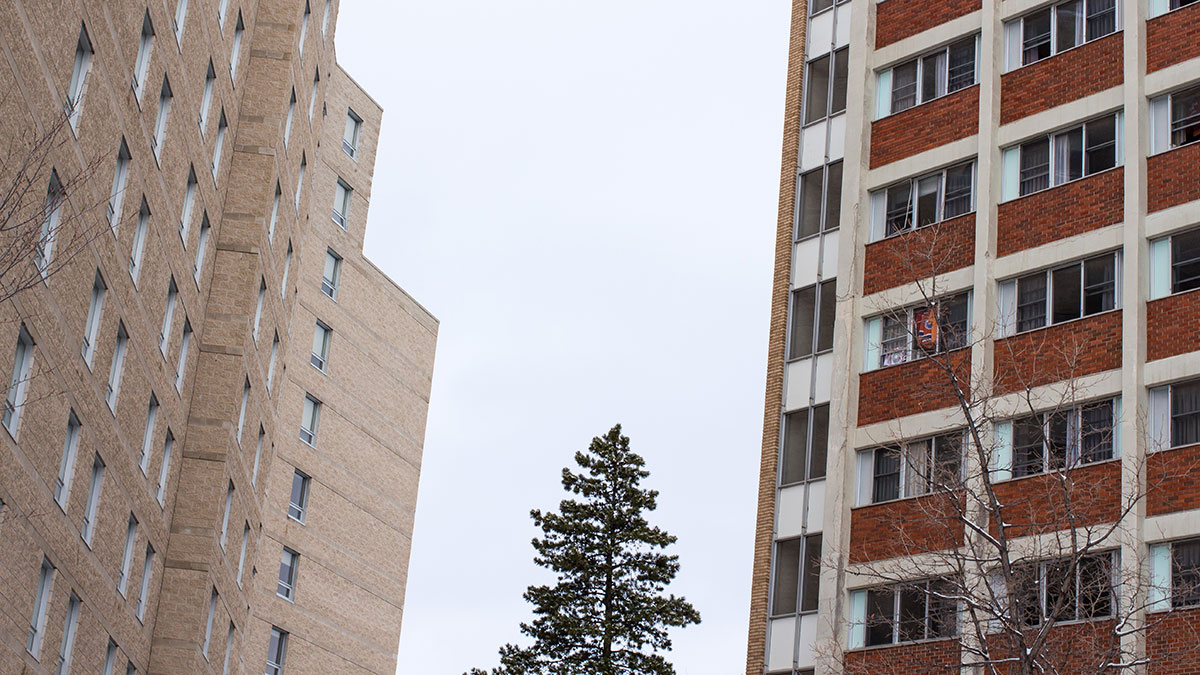Leaderless Lister to continue with no student advocacy in 2016-17
 Christina Varvis
Christina VarvisEfforts to set up an interim student leadership system for Lister students have proved to be fruitless — there will be no student association in Lister next year.
The Students’ Union and the university’s Residence Services couldn’t compromise on a leadership system in Lister in an April 5 meeting. Peer-to-peer mentorship from older, more experienced residents in Lister next year will instead come exclusively from university-employed residence assistants. Student leaders, including SU President Navneet Khinda, had worked on setting up a Lister association since August.
“I’m pretty frustrated,” Khinda said. “I thought (consultation) was going well over the past few months.”
The new association was to take the place of the Lister Hall Students’ Association (LHSA), which is serving its two-year suspension for hazing. For now, the SU and Lister advocates will prepare for the LHSA’s return in the 2017-18 academic year. The currently unused plans for the new association will help restructure the returning LHSA in 2017, Khinda said.
In recent meetings, the SU and the university almost agreed on a four-association model with towers having their own presidents, vice-presidents and floor representatives. Both Sarah Wolgemuth, Associate Vice-Dean of Residence Services, and the Dean of Students Robin Everall were consulted numerous times by the SU to determine an association that worked. An agreement could not be reached as the university wanted floor representative elections in the fall while the SU wanted them this spring. The SU pulled out as a result.
The university approved of president and vice-president elections in the spring, but the SU said this approval came too late, as finals have started. The SU hoped to hold elections before classes ended, as students are too busy studying to campaign in mid-April, Khinda said.
Wolgemuth said the university is “pretty disappointed” that the proposed association is off the table.
Floor representatives would need to be elected in the spring with the executive for the four-association model to work, Khinda said. The SU vied for spring elections to ensure that leadership comes from students with a full year of Lister experience. This way, floor representatives would be elected as first-years in the spring and would live in reserved rooms as second-year representatives in the fall. Earlier elections would also allow for more time to train floor representatives for sexual assault response, mental health and conflict management, which the university requires, Khinda said.
“(Residence Services) wants so much training done by the students, but they don’t give us time to prepare them,” she said. “So the hypocrisy there is a bit jarring for me.”
In the university’s proposal, first-year students living in Lister would be elected as floor representatives in the fall, meaning they would not be returning second-years. Electing first-years as representatives and not saving space for returning second-years also works with President Turpin’s new mandate of guaranteeing all first-years space in residence. Leadership opportunities would give a complete first-year experience, which is what Lister is transitioning to, Wolgemuth said.
“If we are truly designing a first-year experience, then these students should be able to run in an election,” Wolgemuth said. “(The SU) doesn’t believe that first-years are in a position to handle that type of a role … But we’ve seen it happen.”
First-year students have been elected to residence leadership roles in the past when more senior students stepped down. Wolgemuth said there haven’t been any issues with first-years being great student leaders in these cases.
Wolgemuth said she hopes the conversation about student leadership in Lister will continue into the next academic year.
Students, such as Lister advocate Leila Raye-Crofton, still insist that first-years aren’t ideal advocates. Raye-Crofton, who was elected 2015-16 LHSA president before its suspension, emphasized that experience is important in taking up leadership roles, as first-years are usually less as capable in balancing classes and leadership roles, which might lead them to academic distress and mental health problems. Raye-Crofton said it would be wiser to give students a year to adjust to university life and understanding the committment of a leadership role before having them jump into it. If the university gave floor representative positions to first-years, it would be setting them up for failure, she said.
“People still don’t even know how to find their classes, never mind know how to advocate for hundreds of students,” Raye-Crofton said. “It just doesn’t make any sense.”
Student representation in Lister is important when major changes are being decided, Khinda said. Examples include this year’s attempt to increase the Lister meal plan cost by $1,500. Next year, committees will likely be formed to provide student advocacy in these situations. Advocacy in the next year will be important with the university making so many large changes to residence, and with so many first-year residents who may not understand problems with these changes, Khinda said.
“If President Turpin wants to have a successful residence program moving forward, he needs to work in partnership with the students,” Khinda said. “And so far, I don’t think they’ve been taking our concerns seriously.”





The fact that the article can’t even state Sarah Wolgemuth’s actual title just solidifies the fact that the Gateway is turning into garbage.
I want to clarify that while the managers at Residence Services did not flat out say “no, we reject this proposal”, they did respond with “no” to every important aspect of the proposal, thereby effectively shutting down our efforts to negotiate and compromise. I just want to clarify this, because I know a counter narrative will say “well, we didn’t reject the proposal”.